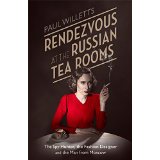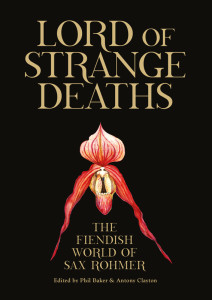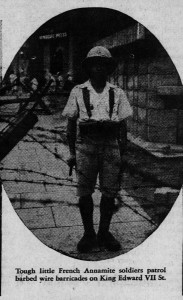Posted: October 1st, 2015 | 1 Comment »
I’ve blogged and written about the old Canidrome dog racing track (that hosted football and boxing as well as dog racing) in Shanghai’s Frenchtown before (numerously – just put “Canidrome” in the archive engine to your right). The Canidrome nightclub was round the corner as was the Hai-Alai Fronton. But there was dog racing in Shanghai before the Canidrome, at two tracks – Luna Park and Stadium. Luna Park, which opened in 1927, was financed by a largely British-backed company (as was Stadium) called Greyhound Racing Ltd whose board included the Shanghai Municipal Council Chairman H.E. Arnhold (old Shanghai didn’t really do “conflict of interest”!). It was popular – over 70,000 often attended the Saturday night races. Eventually Luna Park became a victim of a gambling crackdown in the Settlement and so the Canidrome became the “top dog” of the tracks (sorry!). There’s a significant back story involving corruption and gambling-criminal elements in Shanghai linked to the demise of Luna Park (and Stadium) and the rise of the Canidrome, but I’ll save that for another time. Here then…the dogs let loose….(the keen eyed will note the picture is by the famous Shanghai-based photographer Ah Fong).


Harry Arnhold
Posted: September 30th, 2015 | 3 Comments »
An interesting possible alternative history of the naval war in the Pacific offers itself from Paul Willetts’s new book Rendezvous at the Russian Tea Rooms (which I will get round to reviewing in full in another place soon), about the Tyler Kent affair in early World War Two. I’ve blogged about the China-born Kent before here briefly.

Kent, working in the US Embassy in London in 1940, stole various private communiques between Churchill and Roosevelt. Churchill was obviously keen to solicit aid and possibly military involvement from the American president as continental Europe fell to the Nazis and Britain was left alone.
Among these communiques was one extremely TOP SECRET communique from May 1940 from Churchill to FDR. In it Churchill says:
“I am looking to you to keep that Japanese dog quiet in the Pacific, using Singapore in any way convenient.”
FDR replied:
“As you know, the American fleet is now concentrated at Hawaii where it will remain for the time being…The best of luck to you.”
So FDR didn’t take Churchill up on his offer to utilise Singapore for American naval vessels. But what if he had? Perhaps the Japanese attack on Pearl Harbor would not have been so devastating? Perhaps the invasion of Singapore would have been delayed or averted? Impossible to know of course, but an interesting “what if?” of history I think…..

The troopship RMS Queen Mary in Singapore Graving Dock, August 1940
Posted: September 29th, 2015 | No Comments »
Very happy to report that the recently formed (a couple of years anyway) chapter of the Royal Asiatic Society appears to be going from strength to strength…here’s their October programme….

October Events
- Tuesday 20th – at the Bookworm: “Western Literature in Chinese moviesâ€- a panel discussion led by Laura Daverio and Isobel Wolte
- Friday 23rd – at The Courtyard Institute: “55 Days at Pekingâ€, an RASBJ Film Club showing, introduced by John Olbrich
- Tuesday 27th – at the Bookworm: “Contemporary Chinese Landscape Photographyâ€, an illustrated talk by Yining He
You are on our list to receive event notices by email, and details are also available at www.rasbj.org. Expect more superb events in November and December, which together will illustrate the Society’s developing theme of bringing China and the world together.
If you have found our events interesting, please spread the word – and encourage friends and acquaintances to join RASBJ at http://www.rasbj.org/membership.php.
Posted: September 29th, 2015 | No Comments »
Out this week and with an essay by me on Dragon Ladies and Rohmer….available from the Strange Attractor web site and soon all over
Lord of Strange Deaths: The Fiendish World of Sax Rohmer
Edited by Phil Baker & Antony Clayton

Forever associated with his creation of evil genius Dr Fu Manchu, a Chinese super-criminal scheming to destroy Western civilisation, Sax Rohmer (1883-1959) was the king of pulp exotica. At the height of his fame Rohmer was one of the most popular writers on the planet, but now he is largely remembered for outrageous attitudes and lurid Chinaphobia. Lord of Strange Deaths approaches Rohmer with something more than routine disapproval, and instead brings out the complexity and historical significance of his work.
This is the first extended attempt to do justice to Rohmer, and it ranges across the spectrum of his output from music-hall writing to Theosophy. Contributors focus on subjects including Egyptology, 1890s decadence, Edwardian super-villains, graphic novels, cinema, the French Situationists, Chinese dragon ladies, and the Arabian Nights. The result is a testimony to the enduring fascination and relevance of Rohmer’s absurd, sinister and immensely atmospheric world.
Contributions from:
Jean Augris • Phil Baker • Clive Bloom • Antony Clayton • Gary Dickinson • Christopher Fowler • Christopher Frayling • Paul French • Robert Irwin • Lawrence Knapp • Gary Lachman • Roger Luckhurst • Alan Moore • Steve Moore • Kim Newman • Kevin O’Neill • Mark Valentine • Anne Witchard.
Posted: September 28th, 2015 | No Comments »
Rather jerry-built structures in Shanghai are, it appears, nothing new. Here’s a rather hastily erected British troop bunker designed to defend the Settlement in 1937. Obviously they could fire from ground and raised level and it had a pretty heavily sandbagged frontage, though I doubt the rotunda on top would withstand a tank shell! Sadly, I do not know the exact location of this bunker….

Posted: September 27th, 2015 | No Comments »
We see a lot of pictures of western, Chinese and Sikh police and soldiers in old Shanghai – far fewer Annamite soldiers who worked and served in the French Concession. This picture is from 1940 and is of an Annamite soldier guarding Shanghai’s “Newspaper Row” (Avenue Edward VII) – I’ll blog on the attacks on “Newspaper Row” imminently. Annamite soldiers may have been in Shanghai earlier but certainly the 3rd Regiment of Tonkinese Rifles was posted to Shanghai in 1915, another company was sent to the city in 1927 during the disturbances. Anyway, here’s “A tough little French Annamite” on Avenue Edward VII (Yan’an Road today and the elevated highway)….

Posted: September 26th, 2015 | No Comments »
Some random Yellow Peril pulp covers for your Saturday…..




Posted: September 25th, 2015 | No Comments »
A new exhibition at New York’s Museum of Chinese in America…
PS: More on Poy Gum Lee here in the New York Times
And, more relevantly to this blog, here from Shanghai Art Deco on his Shanghai work (including the old YMCA below with its ornate Chinese roof – now crowded in but once standing majestically)….

September 24, 2015 – January 31, 2016

In this survey exhibition, architectural historian Kerri Culhane documents and explores Poy Gum Lee’s (1900-1968) nearly 50-year long career in both China and New York and examines Lee’s modernist influence in New York Chinatown. This project will result in the first-ever comprehensive list of Lee’s projects in New York. Lee’s hand is visible in the major civic architecture of Chinatown post 1945, which blends stylistically Chinese details with modern technologies and materials. Lee was the architectural consultant for the Chinese Consolidated Benevolent Association’s building on Mott Street (1959) and the On Leong Tong Merchant’s Association at Mott & Canal Street (1948-50) – the most prominent Chinese modern building in Chinatown. Among his highly visible commissions, Lee designed the Chinese-American WWII Monument in Kimlau Square (1962), a modernist take on a traditional Chinese pailou, or ceremonial gate; the Lee Family Association (ca. 1950); and the Pagoda Theatre (1963, demolished).















